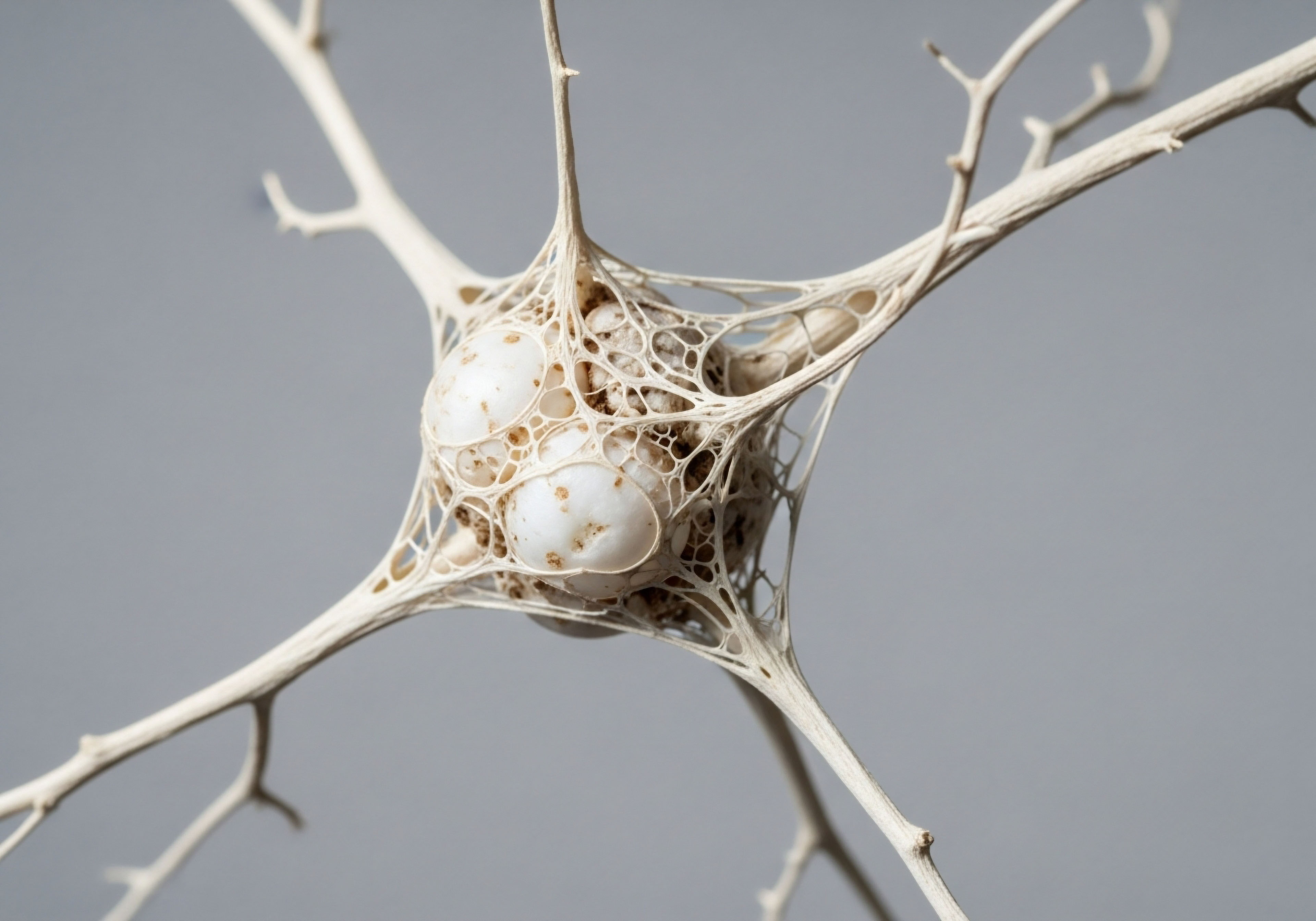

The Fraying Edges of Mental Acuity
The biological journey through life is often perceived as a linear progression, marked by inevitable decline. This perspective is fundamentally flawed. The aging of the human brain is not a passive surrender to entropy; it is an active, complex cascade of physiological shifts that can be understood, mapped, and crucially, engineered for resilience.
To age-proof your brain power is to recognize that your cognitive prime is not a fixed inheritance, but a dynamic system that requires proactive fortification against the erosive forces of time.
At the core of this erosion are fundamental biological processes that accelerate after peak physiological years. Hormonal recalibration is a primary driver. As men and women progress through midlife and beyond, key endocrine signals diminish. Testosterone levels, critical for male cognitive function and drive, begin a steady decline.
Estrogen and progesterone, vital for female neuroprotection, mood regulation, and memory, undergo significant fluctuations and eventual reduction. This hormonal shift impacts neurotransmitter synthesis, synaptic plasticity ∞ the brain’s ability to form new connections ∞ and the very neurogenesis that underpins cognitive renewal.
Metabolic dysregulation presents another formidable challenge. The modern metabolic landscape is often characterized by insulin resistance, a condition where cells fail to respond effectively to insulin. This leads to elevated blood glucose levels and a cascade of negative effects, including increased inflammation and oxidative stress.
The brain, a voracious consumer of glucose, suffers directly from impaired energy supply and compromised mitochondrial function. Mitochondria, the powerhouses of our cells, become less efficient, generating fewer clean energy units (ATP) and more damaging reactive oxygen species (ROS). This cellular energetic deficit and oxidative burden create an environment ripe for neuronal damage and cognitive impairment.
Inflammation and oxidative stress are the silent architects of cellular decay. Chronic, low-grade inflammation, often termed “inflammaging,” permeates aging tissues, including the brain. This inflammatory state damages cellular structures, disrupts signaling pathways, and exacerbates oxidative damage. Oxidative stress, the imbalance between free radicals and the body’s antioxidant defenses, leads to DNA damage, protein dysfunction, and lipid peroxidation, all of which contribute to neurodegeneration.
Furthermore, the process of glycation, where sugars bind to proteins and fats, creates Advanced Glycation End Products (AGEs). AGEs stiffen tissues, impair enzyme function, and promote oxidative stress and inflammation, particularly within the delicate vasculature of the brain. This glycation cascade contributes to reduced blood flow, impaired nutrient delivery, and a diminished capacity for neural repair.
The cumulative effect of these biological shifts manifests as a noticeable decline in cognitive performance. Brain fog, a pervasive sense of mental cloudiness, becomes more common. Memory recall falters, focus wavers, and the speed of information processing slows. Executive functions ∞ planning, decision-making, problem-solving ∞ become more challenging.
Mood disturbances, such as irritability or a diminished sense of drive, often accompany these cognitive changes. These are not random occurrences; they are data points indicating that the brain’s operational integrity is compromised. Understanding these forces is the critical first step toward designing a strategy for perpetual cognitive vitality.
The brain’s functional decline is not an inevitable consequence of aging, but a direct result of systemic biological dysregulation, primarily driven by hormonal shifts, metabolic dysfunction, and chronic inflammation.


Engineering a Bulletproof Mind
Transitioning from understanding the “why” to mastering the “how” requires a shift in perspective. The brain is a high-performance system, an intricate biological machine whose output can be precisely tuned. Age-proofing your brain power is an act of sophisticated biological engineering, leveraging evidence-based interventions to fortify neural architecture and optimize cognitive function. This is not about managing decline; it is about actively upgrading your mental operating system.

Hormonal Recalibration ∞ The Foundation of Neural Drive
Hormones are not mere chemical messengers; they are fundamental architects of our physiology and cognition. Optimizing key hormonal axes is the bedrock of sustained mental acuity.

Testosterone ∞ Beyond Virility, the Cognitive Catalyst
For men, testosterone is far more than a libido enhancer. Clinical research unequivocally links adequate testosterone levels to improved executive function, enhanced spatial memory, and faster information processing speeds. Testosterone therapy, when administered judiciously and under expert supervision, acts as a powerful neuroprotective agent. It supports neurogenesis, increases synaptic plasticity, and modulates neurotransmitter systems, effectively recalibrating the brain’s capacity for complex thought and sustained focus. This is a direct upgrade to the neural circuitry responsible for drive and mental performance.

Estrogen and Progesterone ∞ Female Neuroprotection and Stability
Women possess a distinct hormonal landscape, with estrogen and progesterone playing pivotal roles in brain health. Estrogen exhibits potent neuroprotective and neurotrophic effects, influencing synaptic plasticity, memory consolidation, and mood. Progesterone contributes to calming neural pathways and may also play a role in neuroprotection. Strategic hormone replacement therapy for women, tailored to individual needs and life stages, can mitigate the cognitive and mood disturbances associated with perimenopause and menopause, preserving and enhancing mental sharpness.

Thyroid Hormones ∞ The Metabolic Master Switch
The thyroid gland governs metabolic rate, influencing energy production in every cell, including neurons. Suboptimal thyroid function, even within conventionally “normal” ranges, can manifest as cognitive sluggishness, memory impairment, and reduced mental clarity. Ensuring optimal thyroid hormone levels is a non-negotiable step in maintaining a high-functioning brain.

Peptide Signalling ∞ Delivering New Instructions to Cells
Peptides, short chains of amino acids, act as signaling molecules within the body, orchestrating a vast array of biological processes. Certain peptides offer remarkable potential for neuroprotection and cognitive enhancement, acting as targeted biological tools.
- Growth Hormone Axis Modulators (e.g. CJC-1295, Ipamorelin): These peptides stimulate the body’s natural production of growth hormone (GH) and Insulin-like Growth Factor 1 (IGF-1). GH and IGF-1 are crucial for cellular repair, neurogenesis, and the maintenance of neural tissue. Optimizing this axis supports brain plasticity and resilience.
- Neurotrophic Peptides (e.g. Semax, Selank): Developed for neurological applications, peptides like Semax and Selank have demonstrated potent neuroprotective and neurogenic effects. They can enhanceBDNF (Brain-Derived Neurotrophic Factor) levels, promote neuronal survival, and improve cognitive functions such as learning and memory.
- Tissue Repair Peptides (e.g. BPC-157): While known for its systemic tissue healing properties, BPC-157 also shows promise in neurological contexts, potentially aiding in the repair of damaged neural pathways and reducing inflammation.
These peptides are not generic supplements; they are sophisticated biological modulators that, when applied with precision, can signal cells to repair, regenerate, and perform at higher capacities.

Metabolic Fortification ∞ Powering the Neural Engine
The brain’s relentless demand for energy makes metabolic health paramount. Fortifying your metabolic system ensures a stable, clean energy supply and minimizes damaging byproducts.

Mitochondrial Health ∞ The Cellular Powerhouses
Mitochondria are essential for neuronal function. Supporting their efficiency and number is key. Nutrients like Coenzyme Q10 (CoQ10), Pyrroloquinoline quinone (PQQ), and L-Carnitine play vital roles in mitochondrial energy production and protection against oxidative stress.

Blood Sugar Mastery ∞ Stable Fuel for Cognition
Fluctuations in blood glucose create metabolic chaos. Adopting strategies such as intermittent fasting, ketogenic diets, or precise carbohydrate management ensures a steady, clean fuel source for the brain, reducing glycation and inflammation. This metabolic stability is fundamental for sustained cognitive performance.

Insulin Sensitivity ∞ The Gatekeeper of Cellular Access
Improving insulin sensitivity allows glucose to enter cells efficiently, powering them without causing excessive inflammation. Regular exercise and targeted dietary choices are potent tools for enhancing insulin sensitivity, thereby safeguarding neural energy pathways.

Nutritional Architects ∞ The Building Blocks of Brain Resilience
Nutrition is the raw material from which your brain is built and maintained. Strategic dietary choices provide essential components and protective compounds.
- Omega-3 Fatty Acids (DHA/EPA): DHA is a primary structural component of neuronal cell membranes, critical for fluidity and signaling. EPA provides potent anti-inflammatory benefits, counteracting brain aging processes.
- B Vitamins: These act as essential cofactors in energy metabolism and neurotransmitter synthesis. Deficiencies can impair cognitive function, mood, and neural communication.
- Antioxidants: Compounds like Vitamin C, Vitamin E, Resveratrol, and Curcumin combat oxidative stress, neutralizing free radicals that damage brain cells.
- Choline: A precursor to acetylcholine, a neurotransmitter vital for memory and learning. Found in eggs, liver, and soybeans.

Movement as Neurogenesis ∞ The Active Sculpting of the Mind
Physical activity is not merely for physical health; it is a powerful driver of brain health and cognitive enhancement.
- Aerobic Exercise: Stimulates the production of Brain-Derived Neurotrophic Factor (BDNF), a key protein that supports the survival, growth, and differentiation of neurons. It also improves cerebrovascular health, ensuring adequate blood flow and oxygen to the brain.
- Strength Training: Beyond its benefits for hormonal balance and metabolic health, resistance training has been shown to improve cognitive function, particularly in areas of executive control and memory.
- Complex Movement and Skill Acquisition: Engaging in activities that require coordination, balance, and learning new motor skills, such as dancing or martial arts, actively builds new neural pathways and enhances cognitive flexibility.

Sleep Architecture ∞ The Ultimate Restoration Cycle
Sleep is the brain’s primary period for restoration, consolidation, and repair. Disruptions to sleep architecture have profound negative consequences on cognitive function.
- Deep Sleep (Slow-Wave Sleep): Essential for synaptic homeostasis, clearing metabolic waste products, and consolidating declarative memories (facts and events).
- REM Sleep: Critical for emotional processing, procedural memory consolidation, and creativity.
Prioritizing consistent, high-quality sleep is a fundamental, non-negotiable strategy for age-proofing your brain.

Stress Resilience ∞ Mastering Your Internal Environment
Chronic stress floods the brain with cortisol, a hormone that, in excess, can impair memory, reduce neurogenesis, and promote inflammation. Developing robust stress resilience is vital.
- Cortisol Management: Practices such as mindfulness meditation, deep breathing exercises, and deliberate relaxation techniques help regulate cortisol levels and foster a calmer nervous system.
- Vagal Tone Enhancement: Activities that stimulate the vagus nerve, like singing, gargling, or cold exposure, improve the body’s ability to recover from stress and promote a state of parasympathetic dominance, essential for repair and restoration.
By systematically addressing these pillars ∞ hormonal balance, peptide signaling, metabolic fortification, strategic nutrition, consistent movement, restorative sleep, and stress resilience ∞ you construct a robust defense against cognitive aging, transforming your brain into a high-performance asset for life.
The brain is a biological system that responds directly to targeted interventions. Hormonal optimization, peptide signaling, metabolic mastery, and lifestyle factors are not mere supports; they are the engineering blueprints for perpetual cognitive vitality.


Seizing the Moment for Perpetual Mental Sharpness
The question of “when” to implement strategies for age-proofing your brain power is often framed around reaction rather than proaction. The optimal time is not when cognitive decline is evident, but rather, it is now. A proactive stance transforms the narrative of aging from one of inevitable loss to one of continuous optimization and mastery.

Establishing the Baseline ∞ The Diagnostic Imperative
Before initiating any optimization protocol, a comprehensive assessment is paramount. This involves obtaining baseline measurements across key physiological domains.
- Hormone Panels: Comprehensive assessment of testosterone, estrogen, progesterone, DHEA-S, and thyroid hormones (TSH, Free T3, Free T4). For women, cycle-specific testing is crucial.
- Metabolic Markers: Fasting glucose, HbA1c, fasting insulin, lipid panel, C-reactive protein (CRP) for inflammation, and potentially advanced markers like homocysteine and Lp(a).
- Cognitive Assessment: Baseline cognitive testing, including measures of memory, attention, executive function, and processing speed. These provide objective data against which future improvements can be measured.
- Nutritional Status: Assessment of key micronutrient levels (e.g. Vitamin D, B12, Ferritin, Omega-3 index).
This data-driven approach ensures that interventions are personalized, targeted, and effective, moving beyond generalized advice to precise biological recalibration.

The Proactive Window ∞ Early 30s to 40s
The ideal time to begin implementing robust brain-proofing strategies is well before significant age-related changes become apparent. In the early 30s and 40s, the body is still highly responsive, and foundational health habits can be established with maximum impact.
- Foundation Building: Focus on establishing consistent, high-quality sleep architecture, a nutrient-dense diet, and a regular exercise regimen that includes both aerobic and strength training.
- Early Hormonal Monitoring: Begin monitoring key hormone levels. For men, understanding baseline testosterone is key. For women, tracking menstrual cycle regularity and associated symptoms provides vital data. Addressing any emerging imbalances early can prevent downstream cognitive effects.
- Metabolic Vigilance: Proactively manage blood sugar and insulin sensitivity through diet and exercise. This prevents the onset of insulin resistance, a major contributor to cognitive decline.
This period is about creating a resilient biological foundation, optimizing systems before they begin to falter. It is the phase of preventative engineering.

Intensified Optimization ∞ 50s and Beyond
As individuals enter their 50s and beyond, the biological shifts associated with aging become more pronounced. This phase demands a more intensive and targeted approach to cognitive maintenance and enhancement.
- Strategic Hormone Replacement: For many, hormone replacement therapy (HRT) becomes a critical component. Testosterone therapy for men and appropriate estrogen/progesterone therapy for women can significantly restore cognitive function, mood, and vitality. This is not about artificial youth, but about restoring optimal physiological signaling.
- Peptide Protocols: Targeted peptide therapies can play a significant role in supporting neurogenesis, reducing inflammation, and enhancing cellular repair mechanisms that may be less efficient with age.
- Mitochondrial Support: Increased focus on supporting mitochondrial function through targeted supplementation and metabolic strategies becomes crucial as cellular energy production naturally declines.
- Neuroplasticity Training: Continued engagement in learning new skills, complex problem-solving, and mentally stimulating activities is vital to maintain and enhance neural plasticity.
The emphasis shifts from prevention to active restoration and optimization, leveraging advanced tools to counteract the more pronounced effects of aging on the brain.

The Continuous Calibration ∞ An Ongoing Process
Age-proofing the brain is not a one-time fix; it is a dynamic, ongoing process of calibration and adjustment. The body’s needs evolve, and so must the strategy. Regular re-evaluation of biomarkers, cognitive performance, and subjective well-being allows for continuous refinement of the optimization plan.
The Vitality Architect’s approach is one of perpetual learning and adaptation, ensuring that the brain remains a sharp, resilient, and powerful asset throughout life. The moment to begin is always the present one, armed with knowledge and a commitment to proactive biological mastery.

The Ascendant Mind
The journey to age-proof your brain power is a testament to human agency. It is a deliberate, scientific pursuit that reframes aging not as a passive descent into decline, but as an opportunity for continuous growth and peak performance. By understanding the intricate biological mechanisms that influence cognitive function ∞ from hormonal signaling and metabolic efficiency to cellular repair and neural plasticity ∞ we gain the power to engineer our own mental resilience.
The Vitality Architect’s philosophy is one of empowered mastery. It recognizes that the brain, like any sophisticated system, thrives on precise inputs and strategic maintenance. Hormonal recalibration, the intelligent application of peptide science, the fortification of metabolic pathways, and the foundational pillars of nutrition, movement, sleep, and stress management are not merely components of a health regimen; they are the tools with which we sculpt a future of sustained mental acuity, unwavering focus, and profound cognitive vitality.
This is a call to transcend the conventional narrative of aging. It is an invitation to view your biology not as a set of limitations, but as a dynamic blueprint ripe for optimization. The future of cognitive power is not something that happens to you; it is something you actively build, day by day, with informed action and unwavering commitment. Embrace the science, master your biology, and unlock the enduring potential of your ascendant mind.

Glossary

brain power

cognitive function

estrogen and progesterone

neuroprotection

oxidative stress

neurogenesis

brain plasticity

metabolic health

insulin sensitivity

peak performance




